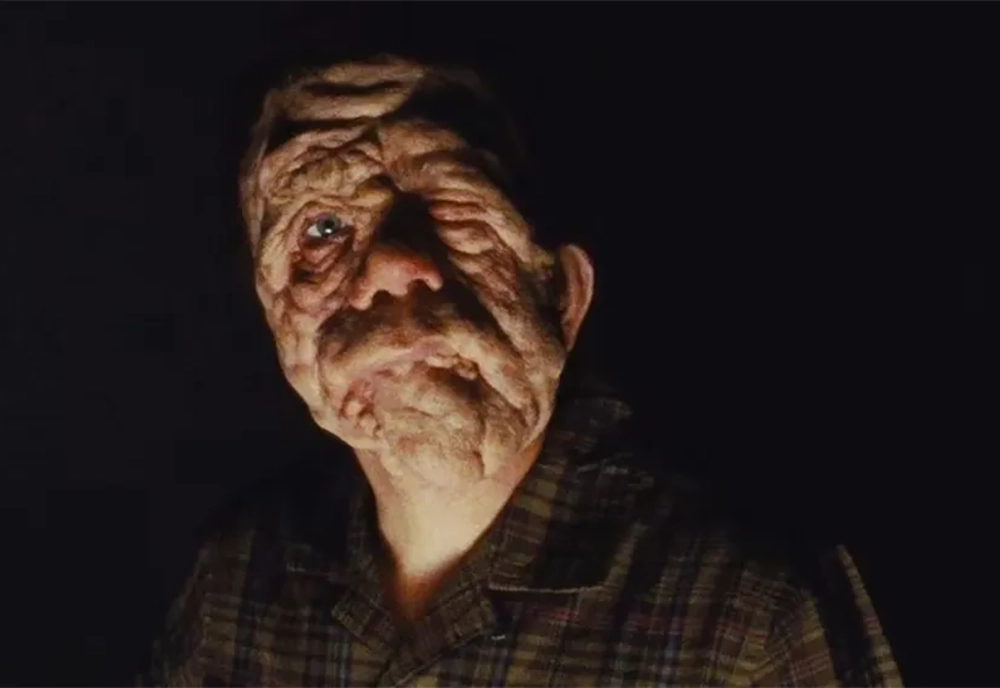A maze of excess which pairs peril and sudden shrieks of laughter, Aaron Schimberg’s “A Different Man” basks in a discomforting mix of glee and terror. This twisty, pitch-black comedy opened Film at Lincoln Center’s New Directors/New Films Festival on Wednesday, a guaranteed crowd-rouser backed by the indie kingmaker A24. And the dark, deep plunge is very much an A24 joint, on-brand for a studio known for backing gifted, offbeat auteurs—Ari Aster, Greta Gerwig, the Safdie brothers—who specialize in flawed, fearful protagonists and visually-arresting narrative detail. Schimberg’s mischievous, imperfect film is wickedly unhinged, tackling taboo subject matter with a smirk, intricately building and dismantling a bonkers—and somehow, believable—world towards a hasty yet unpredictable curtain drop.
Thanks to Umberto Smerilli’s creaky, melodic score, “A Different Man” throbs with a look-both-ways anxiety, maintained on-screen and embodied by a dynamite trio of lead performers: Sebastian Stan, Renata Reinsve, and Adam Pearson. Stan (who won ‘Best Leading Performance’ at the Berlin International Film Festival) plays Edward, whose severe facial disfigurement subjects him to shocked glances and whispers on the subway, in his apartment building, and at work. He’s an actor, a fortuitous common ground with his playwright neighbor Ingrid (Reinsve), whose curiosity entices Edward, to a point. During their second meeting, she offers to pop a blackhead on Edward’s nose, and his visible, physical recoiling seals that evening. Still, he welcomes her back, alternating between kind gestures (he gifts her a typewriter) and tactical withholding (yes and no answers to personal questions), protecting himself from an unfamiliar mutual attraction he can’t trust.
‘A Different Man’ Throbs with Anxiety
A hole in the middle of his ceiling raises the antennas for some major symbolism. Edward doesn’t rush to fix the hole; instead, he puts a bucket underneath it to let the water drip. And yet, his friendship with Ingrid blooms. Ingrid’s not aloof, just aggressively extroverted, so she can answer her own loaded question: “What happened? It’s not my business.” Edward’s perpetual slouch exudes a nagging unease that follows a daily grind of making himself invisible. He knows people are looking, so he looks away, to comfort others, and save himself. But, he’s rejuvenated, handing over the typewriter and suggesting that, in lieu of payment, Ingrid could write a part for him. Adding fuel to Edward’s fire is his optimism about a trial medical procedure aimed at fixing his facial condition, lack of clinical trials be damned.
The surgery is a success to the extent it turns Edward into a different man. Skin sheds off, and poof, he’s no longer Edward, he’s Sebastian Stan playing a guy, who will soon assume the identity of Guy. At a bar—Stan’s gifts on full display—he gets drunk with a group of rowdy fans, screaming and pounding his fist against the table, forging a connection through macho gestures (towards the male strangers) and flirtatious glares (at women). He takes shots, makes out with girls, and from that hazy night Schimberg fast-forwards to Guy’s new and improved life, in a blindingly white apartment (minus a defected ceiling) with a bedmate who also happens to be a co-worker. Later that day, Guy sees Ingrid getting off the subway in Manhattan’s East Village and follows her all the way into a cozy, rickety playhouse.
A Playful Nightmare, Deserving of a Cult Following

On-stage, Guy marvels at the performance, a conversation too familiar to believe. Ingrid has written a play about Edward, re-framing their relationship and reimagining how it all ended. Invigorated and enraged, Guy bulldozes his way into the play and Ingrid’s life, a frictionless advance until Oliver (Pearson) shows up to a rehearsal. Oliver interrupts Guy’s monologue with compliments, but Guy is frozen, looking into the eyes of a man who has the exact condition he had, pre-operation. The two strike up a friendship, but Guy’s wary, especially when Oliver begins to charm Ingrid. These scenes belong to Pearson, whose natural charm and cheeky humor steals the hearts of his co-stars and ultimately, claims what matters to Guy. Thus, the gaping, dripping hole has returned, which Schimberg resolves with an off-the-rails finale rotating Guy’s arc through a harried cycle of crime, punishment, and redemption.
Schimberg doesn’t hide a considerable debt to Charlie Kaufman’s surreal, sad fables; and indeed at the end, the trio’s late-life reunion in Lower Manhattan, might as well be in their own version of “Synecdoche, New York” [City]. The Jekyll-and-Hyde interplay between Guy and Oliver often evokes Nic Cage’s dueling doppelgangers in Kaufman’s “Adaptation.” But when the absurdity reigns, the film doesn’t lose steam, keeping pace with the film’s manic energy. The play-within-the-film mirrors the chaos on-screen, balancing venomous behavior with surprising doses of humanity. In many ways, it’s an homage to influences: Kaufman, sure, but the heightened stage antics conjures Alejandro González Iñárritu’s scabrous, high-voltage “Birdman.” Still, Schimberg’s third feature is more than an imitation game. It’s a playful nightmare, deserving of the cult following it will inevitably develop if A24 has any say in the matter.
The New Directors/New Films Festival runs from April 3rd – April 14th.